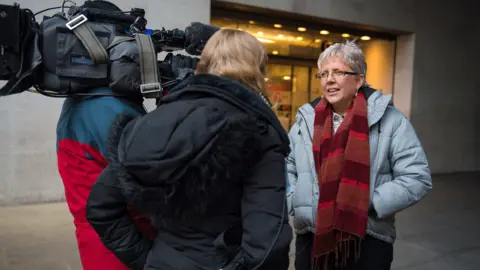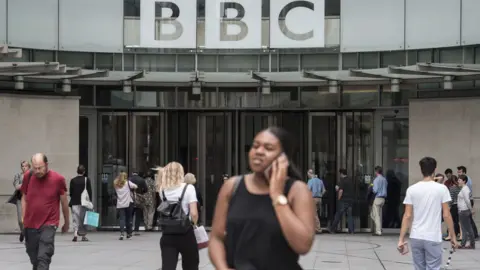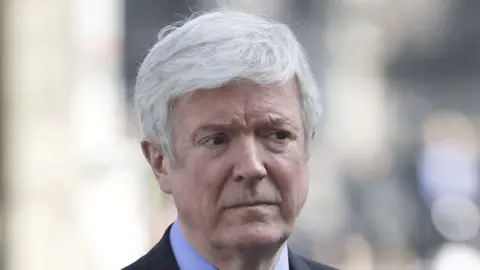BBC Women: Their pay gap stories
 PA
PAFourteen women have given written testimonies based on their experiences of pay negotiations at the BBC.
One said her line manager told her "the BBC doesn't do equal pay".
The evidence was submitted ahead of Wednesday's parliamentary select committee hearing about the gender pay gap at the BBC.
There, the Digital, Culture, Media and Sport (DCMS) committee heard from the BBC's director general Tony Hall.
Carrie Gracie, who recently resigned as the BBC's China editor over pay disparity, also appeared.
Most women who gave written evidence, via the BBC Women group, did not wish to give their names out of concern for their careers at the corporation.
Here are the women's stories in full:
1. TV news presenter
"In 2017 just before the BBC published pay over £150,000, I was called unexpectedly offered an immediate pay rise. It became apparent that for nearly three years I had been sitting next to a man doing an identical job who was being paid tens of thousands of pounds more. As we are both BBC staff that means I have not just missed out on pay, but on pension contributions too. I am told that we are now being paid at the same rate per day, but there is no transparency."
2. Former BBC Scotland health correspondent Eleanor Bradford
"I was BBC Scotland's health correspondent from 2001 to 2016. I discovered I was one of the lowest paid correspondents at BBC Scotland, despite regularly appearing on UK-wide news and delivering exclusive stories. I regularly asked for a pay rise, and eventually cited equal pay legislation. This led to an immediate increase of £5,000 but it was not backdated. I remained around £10,000 below some male colleagues who were doing identical correspondent jobs. In one of my annual appraisals I was told I was a 'model correspondent'. I left the BBC."
3. National radio presenter
"I am an award-winning broadcaster with more than 20 years' experience. In 2014, I was offered a contract to present a flagship arts programme. Two men with no broadcasting experience who had also been given trial shifts presenting the programme during the search for a new presenter were paid 25% more per programme. Then I found out that the existing male presenter was being paid 50% more than me per programme. When I asked for the pay gap to be corrected the line manager told me 'the BBC doesn't do equal pay', and that in raising the issue I was being 'aggressive'. I refused to back down and eventually was given the same rate as my male colleague and it was backdated."
 PA
PA4. Reporter
"My full-time equivalent salary for making identical programmes is about half my male counterpart's. I challenged my grade and asked for an equal pay review. The BBC took months to deal with my enquiry and refused to recognise that it was a claim for my legal right to equal pay for equivalent work. Eventually I was offered a series of increases adding up to a total of between 20-25%, with minimal back pay, which I felt I had no option but to accept because of the stress involved. It has brought me nowhere close to the salary of my male colleague. He also gets extra resources for his programmes, at the expense of others. I don't resent my male colleague. He is talented and deserves it. But we need parity of pay, resources and opportunity."
5. National broadcaster
"Since July I have been offered a 65% pay rise, whilst also being told that the BBC is 'satisfied there was no issue of equal pay' in my case. In pay terms this offer would bring me in line with the lowest paid of the presenters who work on the same programme as I do. That is despite my longer service on that programme. In contractual terms I am still disadvantaged as, unlike fellow presenters, I am not on full staff so have not benefited from pension rights accrued over many years."
6. News programme presenter
"When I was appointed to my current job in October 2013, there followed six months of negotiations over my salary. It was eventually set at £53,600 for three days per week. In absolute terms I am well paid and I recognise and appreciate this. However, at the time this sum was agreed, I had no idea of how my pay compared to that of my fellow presenters. On publication of the 'talent list' in July 2017, I learnt that I am paid hundreds of thousands less than some of my colleagues. I am also paid £45,000 less than my immediate male predecessor. No-one has explained to me how such a discrepancy can be justified."
7. Sports broadcaster
"I have worked for the BBC for almost 30 years, both staff and freelance. I present major sports coverage on national radio. In 2017 my contract was worth £19,000 for 50 days, reporting and presenting. This is an average day rate of £380. When I present one of the flagship radio sports programmes I am paid £500. I have been told the male presenter is paid £1,200. Since raising the issue of equal pay I have been offered £650 which is still a long way short of equal pay. What you are worth is solely at the whim of management who essentially in sport are always men. I'm at the top of my game, knowledgeable and with three decades of experience, yet I'm scratching around to earn a living."
 PA
PA8. UK-based on-air editor
"In 2017 I discovered one of the male UK-based editors reporting for the same flagship programmes is paid between 50% and 100% more. Since then it has become apparent other male on-air editors making equivalent news pieces, for the same news programmes, are also paid significantly more. The BBC has refused to accept there is an equal pay issue, but offered me an on-the-spot 10% increase. I have not accepted as it does not resolve the wider issue around pay inequality."
9. Nations and regions presenter
"I have co-presented with a male colleague for many years. Despite working fewer hours than me, he earns more. Pro-rata, I estimate he's paid around double what I earn for doing the same job. Both colleagues and the public would consider us equals. I raised the equal pay issue many times over the years, but nothing was done."
10. Sport editor
"I lead a sports team in a big city with Premier League teams in our patch. There are few women in equivalent jobs, none in a big city. I believe I have been paid less than my male counterparts across the UK for most of the time I have been doing this job. Four men doing the same job have confirmed their salary is higher by up to £10,000. I have no confidence in the BBC review process. I tried asking for equal pay in 2017 and recently heard it is still under review."
11. Radio 4 reporter
"In 2017 I submitted an equal pay claim after finding out that a male colleague was being paid £7,000 more for doing the same job. I made little progress, so I began a formal grievance. A few days before the hearing I was called in and offered £4,500 extra a year. I was told it was not because they thought I had an equal pay claim, but a reward for hard work. I am considering further action as they refuse to backdate my pay."
12. National radio presenter
"I have worked alongside my male co-host for six years so far and for all that time have been paid at one third of the rate he is paid. We work broadly the same hours with equal production input into the programme. Pay query raised in autumn 2016, only to be told there was no issue. Pay revised July 2017. Case still subject to negotiation and part of NUJ collective grievance."
13. National radio presenter
"I used to present a breakfast news programme in BBC local radio. In 2013, Tony Hall set a target to increase the number of women presenting in local stations. Shortly afterwards I was told my job was at risk and then that I could stay, but only on half my previous salary. It was also half of the amount being paid to my then male co-presenter. As the sole breadwinner I eventually had no choice but to leave. I now present on BBC national radio and earn what I believe is less than half of my current male co-presenter's salary for the demanding show we both present."
14. Presenter regional news
"I am one of two main presenters on a regional TV news programme. I have the same role as my male colleague, contracted to the same number of hours and days per year. I am often called upon to present more demanding programmes, such as election debates, in preference to my male colleague. I have 28 years experience as a journalist. In 2012 I became aware of my male colleague's salary, which was a third more than the figure I had been offered. Despite assurances of a comprehensive pay review, none was forthcoming. There was a point blank refusal to a request for equal pay. Eventually I was given a 5% increase in 2017. I can't see any justification for the pay gap which remains."

Follow us on Facebook, on Twitter @BBCNewsEnts, or on Instagram at bbcnewsents. If you have a story suggestion email [email protected].
